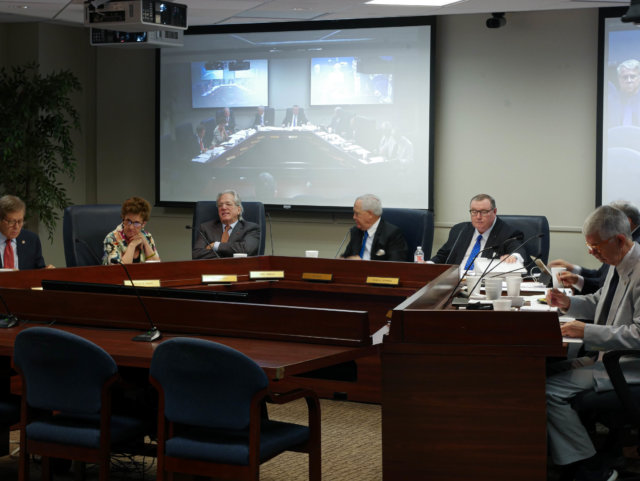
The Oklahoma State Regents for Higher Education approved increases to tuition and/or mandatory fees for 16 of Oklahoma’s 25 public colleges and universities Thursday, despite the system receiving $28 million in new appropriations from the Legislature for next year.
Tuition and mandatory fees will increase an average of 2.5 percent statewide for the 2019-2020 academic year, according to a press release distributed during the meeting.
The state’s two largest institutions — The University of Oklahoma and Oklahoma State University — did not increase undergraduate tuition and mandatory fees for next year. Neither did Oklahoma City Community College.
“Our public higher education institutions have operated in an extremely challenging fiscal environment for the last eight years, and we appreciate that Gov. [Kevin] Stitt and the Legislature provided an increase in appropriations for higher education for FY 2020,” Jay Helm, chairman of the state regents, said in the press release.
Helm said increasing college degree completion to strengthen Oklahoma’s workforce and economy has continued to be the state system of higher education’s top priority.
In a meeting one day prior, 25 state institutions presented budget reports and information about tuition and mandatory fees. Several institutions also presented requests for salary increases for their faculty and staff, and some said they would pay for those increases with the money acquired from tuition hikes.
“The state regents and our public colleges and universities remain committed to keeping higher education affordable for all Oklahomans,” Chancellor Glen Johnson said.
The release said state law requires tuition to remain at levels below the average among comparable institutions, and Oklahoma’s public colleges and universities continue to keep tuition within those limits.
The following colleges and universities received approval for an increase in tuition and mandatory fees:
- University of Central Oklahoma (1.4 percent)
- East Central University (2.4 percent)
- Northeastern State University (4 percent)
- Northwestern Oklahoma State University (1.5 percent)
- Rogers State University (1.7 percent)
- Southwestern Oklahoma State University (1.5 percent)
- Langston University (1.6 percent)
- Oklahoma Panhandle State University (1.5 percent)
- University of Science & Arts of Oklahoma (4.8 percent)
- Connors State College (0.3 percent)
- Northeastern Oklahoma A&M College (2.8 percent)
- Northern Oklahoma College (3.4 percent)
- Redlands Community College (9.1 percent)
- Rose State College (2 percent)
- Seminole State College (3.4 percent)
- Tulsa Community College (3.1 percent)
Financial struggles for smaller institutions
During Wednesday’s meeting, the state regents acknowledged a financial problem within higher education.
For some smaller Oklahoma universities and colleges, enrollment has decreased and budgets were forced to be cut. For Northern Oklahoma College, President Cheryl Evans said state appropriations count toward 33 percent of NOC’s overall operating budget. Evans also said 64 percent of the college’s operating budget will come directly from tuition and fees this year.
In 2002, state allocations counted for 70 percent of NOC’s budget, she said. Higher education appropriations also dropped significantly in recent years before this year’s increase.
In the academic year of 2018-2019, NOC cut 15 positions and will decrease their budget by about $2.5 million.
NOC requested an increase in tuition by 3.4 percent in order to afford a raise for staff, a first in five years. Regent Jeff Hickman, a former House speaker from northwestern Oklahoma, said it was the “most responsible request.”
“Right now, the base salary for our incoming staff is $23,000 a year,” Evans said. “That’s a full-time job.”
Of NOC’s remaining 150 staff members, 88 of them make less than $31,000 a year, Evans said.
“I’m glad everyone is expressing gratitude (to the Legislature), and appropriately so. But, we are not where we need to be. The state is not properly funding higher education,” said Andy Lester, a regent. “We as a state need to serious about higher education. We’re planning to fund higher education, or we’re planning to shut it down. I hope we aren’t planning to shut it down.”
Regents previously allocated about $5.8 million from a reserve fund in order for state institutions to provide a pay raise to faculty. However, regent and former Oklahoma State Supreme Court Chief Justice Steven Taylor said in an interview that the institutions are left to find money on their own to provide benefits.
“We’ve talked about that with every president who has been up here raising tuition,” Taylor said. “And the point is that some of the institutions are having to find the benefits.”
Helm said that NOC has tenured instructors with either a masters or a double masters making less than a public school teacher.
The approved pay raise will now bring NOC’s base pay for faculty to just over $41,000, Evans said.
Moratorium on function change extended
During Thursday’s meeting, the regents voted to extend the current moratorium on institutional function change and mission expansion, deferring consideration of any institutional requests through June 30, 2020.
In May 2018, the regents approved a moratorium on consideration of potential changes in college and university functions and missions through June 30, 2019, according to a press release.
Following the recommendation of the Task Force on the Future of Higher Education, the regents are in the process of conducting fiscal reviews and long-term viability assessments of all 25 state colleges and universities, according to the release.
“Several recommendations of the Task Force (…) focus on the value and efficiency of academic credentials and increased institutional collaboration on various areas, including degree programs,” Helm said in the release.





















